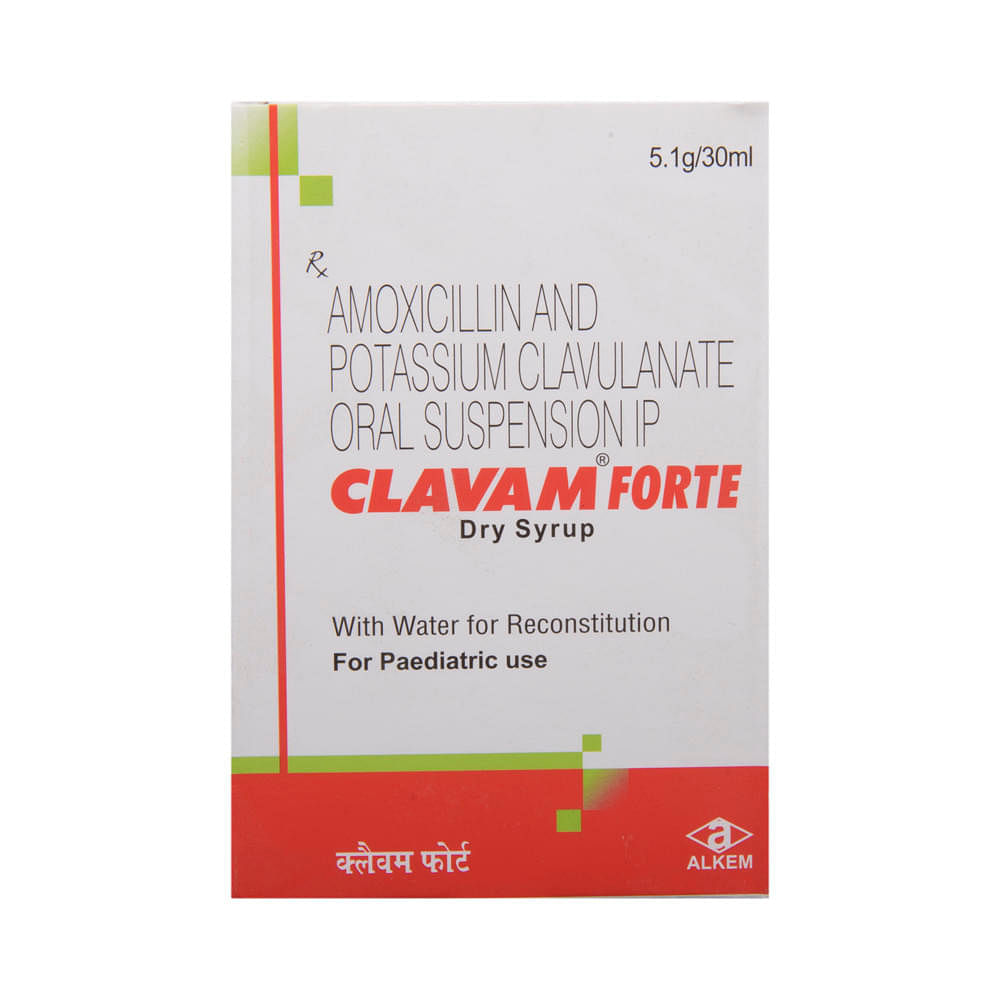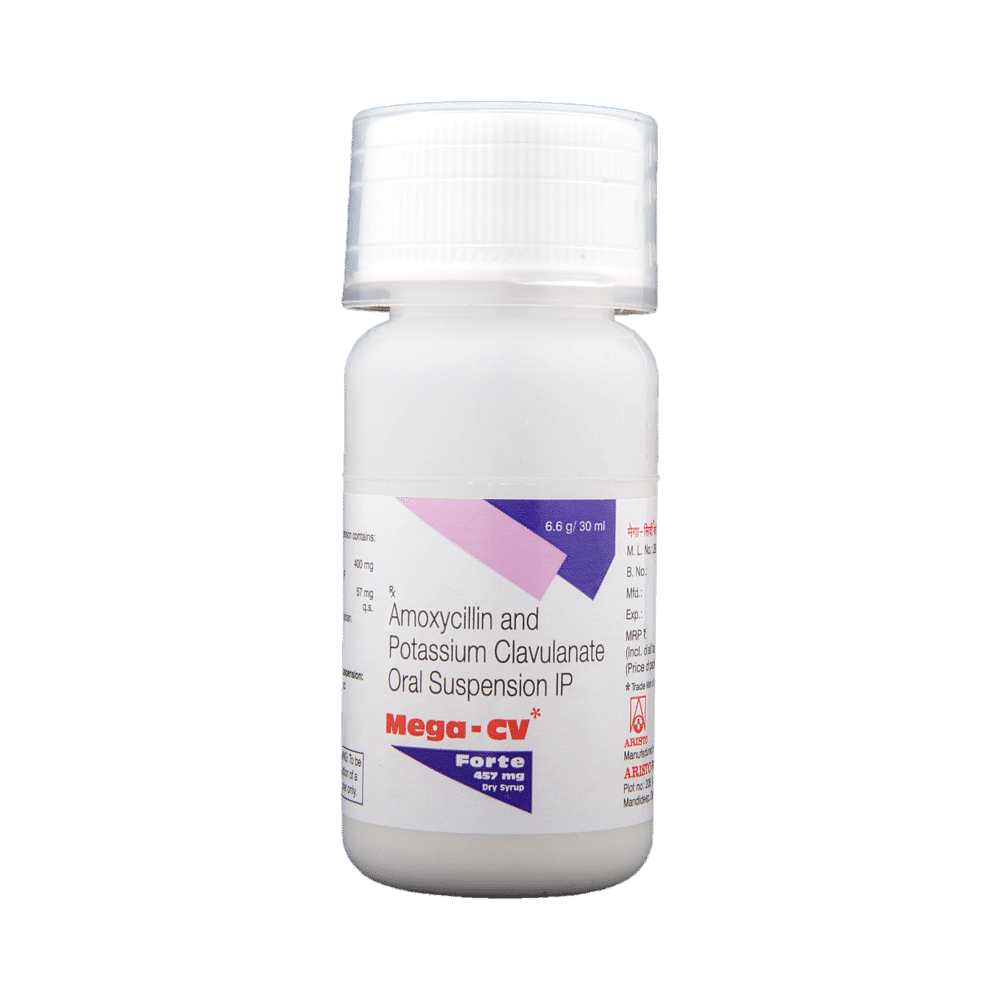
Zypclav DS Dry Syrup
Manufacturer
Apa Pharmaceuticals
Salt Composition
Amoxycillin (400mg/5ml) + Clavulanic Acid (57mg/5ml)
Key Information
Short Description
Zypclav DS Dry Syrup is an antibiotic used to treat bacterial infections of the ear, nose, throat, chest, lungs, teeth, skin, and urinary tract.
Dosage Form
Dry Syrup
Introduction
Zypclav DS Dry Syrup is an antibiotic medicine that helps treat bacterial infections of various parts of the body including the ear, nose, throat, chest, lungs, teeth, skin, and urinary tract. It is particularly effective against bacteria that have developed resistance to other antibiotics, making it useful in treating resistant tuberculosis. The medication contains two active ingredients, amoxycillin and clavulanic acid, which work together to inhibit bacterial growth and survival. While generally safe, it is important to complete the full course of treatment to prevent the bacteria from becoming resistant. Common side effects may include a bitter taste in the mouth and diarrhea. Always consult a doctor before starting this medication.
Directions for Use
Administer Zypclav DS Dry Syrup as prescribed by the doctor. Ensure the child completes the entire course of antibiotics. Do not use it to treat viral infections like the common cold or flu.
How it works
Zypclav DS Dry Syrup contains amoxycillin and clavulanic acid. Amoxycillin prevents the formation of the bacterial cell wall, essential for bacterial survival. Clavulanic acid inhibits beta-lactamase, an enzyme produced by resistant bacteria, making the combination effective against various infections.
Quick Tips
Your child must complete the entire course of antibiotics. Stopping too soon may cause the bacteria to multiply again, become resistant, or cause another infection. Your child may have a bitter taste in the mouth after the intake of Zypclav DS Dry Syrup. Eating citrus fruit or sipping plenty of water or fruit juice may help. Encourage your child to drink plenty of water in case diarrhea develops as a side effect. Never give Zypclav DS Dry Syrup until and unless prescribed by the doctor. You must also never share your child’s medicine with anyone else even if they show similar symptoms. Do not give Zypclav DS Dry Syrup to treat common cold and flu-like symptoms caused by viruses.
Related Medicines

Clavam Forte Dry Syrup

Mega-CV Forte 457mg Oral Suspension

Curvimox CV Forte Dry Syrup

Bax CV 400mg/5ml/57mg/5ml Dry Syrup

Clanoxy 400mg/5ml/57mg/5ml Dry Syrup

Ab-CV Forte Dry Syrup

Penhance Dry Syrup

Clavgic Forte Dry Syrup

Mexclav CV Duo Dry Syrup

Omclav Duo Dry Syrup
Frequently asked questions
Can other medicines be taken with Zypclav DS Dry Syrup?
It is essential to inform your child's doctor about any other medicines your child is taking before starting Zypclav DS Dry Syrup. Additionally, consult with your child's doctor before giving any medicine to your child, as Zypclav DS Dry Syrup may interact with other medicines or substances.
Can my child receive vaccinations while taking Zypclav DS Dry Syrup?
Antibiotics usually do not interfere with vaccine ingredients or cause adverse reactions in children who have just been vaccinated. However, it is recommended to wait until your child has recovered from the illness before getting vaccinated. Once your child feels better, the vaccine can be administered.
What lab tests may my child undergo while taking Zypclav DS Dry Syrup long-term?
During prolonged therapy, your child's doctor may monitor kidney and liver function tests periodically to monitor your child's condition.
Can I give my child a higher dose of Zypclav DS Dry Syrup than recommended?
No, giving a higher dose of this medicine than recommended can increase the risk of side effects. If your child experiences increased severity of symptoms, consult your doctor for re-evaluation.
Can I stop giving Zypclav DS Dry Syrup to my child when symptoms are relieved?
No, do not stop giving this medicine to your child unless the full course of treatment is complete, even if you feel better. The symptoms may improve before the infection is completely cured. Continue giving the medicine for the recommended duration, as it may still be showing beneficial effects.
Can the use of Zypclav DS Dry Syrup cause diarrhea?
Yes, Zypclav DS Dry Syrup may cause diarrhea. This is because the medicine kills harmful bacteria, and it may also affect the helpful bacteria in your child's stomach, leading to diarrhea. If your child experiences diarrhea, encourage them to drink plenty of water or other fluids. If diarrhea persists and you notice signs of dehydration, such as less frequent urination with dark-colored and strong-smelling urine, consult your doctor. Do not give any other medicine to your child without consulting a doctor.
Do all viral common colds result in secondary bacterial infection?
Most of the time, bacterial infections do not follow viral infections. Giving antibiotics in viral infections can increase your child's risk of developing side effects. Use antibiotics only after consulting with your child's doctor.
Is yellow-green mucus in my child's nose a sign of a bacterial infection?
Yellow or green mucus in the nose does not necessarily mean that antibiotics are needed. During a common cold, it is normal for mucus to thicken up and change from clear to yellow or green. Symptoms often last for 7-10 days.
Are there any signs that show my child needs immediate medical attention?
You must call your child's doctor immediately if your child experiences serious allergic reactions (breathing problems, skin rashes), gastrointestinal infections (diarrhea), or liver damage (weakness, paleness, vomiting). These side effects are rare but serious and require expert attention.


